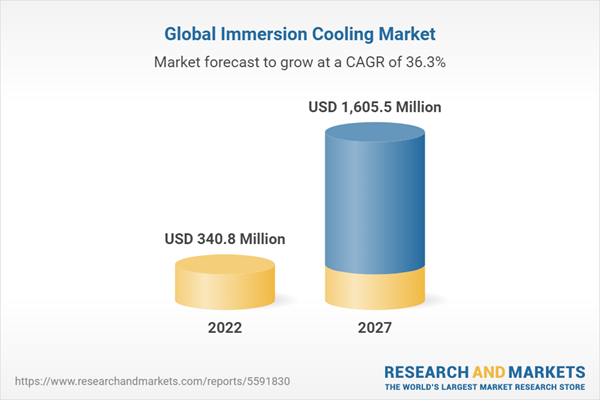Global Immersion Cooling Market to Reach $1,605.5 Million by 2027
The global immersion cooling market was estimated to be at $251.0 million in 2021, which is expected to grow with a CAGR of 36.3% and reach $1,605.5 million by 2027. The growth in the global immersion cooling market is expected to be driven by increased water scarcity and boosting numbers of number of colocation and hyper data centers.
Market Lifecycle Stage
The immersion cooling market is in a growth phase. Cooling is a standard part of data center operations as servers and networking devices constantly run 24/7, which increases the core temperature, which if not controlled, can lead to data center outage. Reduce water scarcity, climate actions, sustainable urban infrastructure, and recycle and reusability are some of the SDGs that are expected to drive innovations and improvements toward the adoption of liquid cooling technologies. Therefore, growing number of data centers are resulting in a boost in the utilization of immersion cooling techniques.
Impact
- Immersion cooling highly impacts thermal managements techniques with the use of dielectric coolants which can be potentially used on high-density data centres. This dielectric liquid permits deploying CPU and GPU clusters much closer collectively, i.e., in high-density configurations, while protecting crucial elements from thermal and environmental risks.
- Immersion cooling bridges the gap between traditional and future data centres. It not only improves the data infrastructure system efficiency but also cuts by a huge margin the amount of energy consumed. This leads to reduced energy bills and carbon footprint.
Impact of COVID-19
Due to the COVID-19 pandemic, the revenues have gone down slightly in 2020 and may resume an uptrend gradually from 2021. Therefore, immersion cooling companies have adopted strategies to come back positively from this crisis, and therefore, the global immersion cooling market is anticipated to bounce back more robustly in the future. This is due to increase in data usage by 34% from the pre-pandemic times.
Market Segmentation
by Application (Blockchain, High-Performance Computing, Data Center)
by Technology (Single-Phase Immersion Cooling System, Two-Phase Immersion Cooling System)
The single-phase immersion cooling is estimated to grow at the highest growth rate during the period 2022 to 2027. This type of immersion cooling technology always remains in liquid form as it never changes its state from liquid to gas.
by Region
- North America - U.S., Canada, and Mexico
- Europe - Germany, France, Spain, Netherlands, and Rest-of-Europe
- China
- U.K.
- Asia-Pacific and Japan - Taiwan, India, Japan, Australia, Singapore, and Rest-of-Asia-Pacific and Japan
- Rest-of-the-World- Middle East and Africa and South America
North America generated the highest revenue of $92.0 million in 2021. The region is experiencing an immense increase in the operational applications of immersion cooling such as data centers and edge computing systems. Therefore, the technology is being challenged by other alternatives in the cooling segment. Asia-Pacific region is anticipated to grow at a faster rate.
Recent Developments in Global Immersion Cooling Market
- In January 2022, Green Revolution Cooling collaborated with Intel to reduce the environmental impact of digital infrastructure. This will result in the customers to develop and implement advanced immersion cooling techniques in future data centers.
- In March 2021, Submer and SYNNEX Corporation joined forces. According to the agreement, Submer’s range of liquid cooling and edge-ready solutions will be manufactured in the U.S. and distributed by SYNNEX.
- In September 2018, Fujitsu launched a liquid immersion cooling system which will support in reducing the total cost of ownership.
- In March 2021, LiquidStack, launched from stealth mode with new deployments across vital sectors such as high-performance computing (HPC), cloud services, artificial intelligence (AI), edge and telecommunications, and funded by Strategic Partner Wiwynn in Series A funding round.
Demand - Drivers and Limitations
Following are the demand drivers for the immersion cooling market:
- Increasing Need for Sustainable Cooling Solutions
- Reduction in Operational Costs
The market is expected to face some limitations too due to the following challenges:
- Alternative Technologies Existing in the Market
- Additional Costs in Case of System Failures and Fluid Leakages
How Can This Report Add Value
Product/Innovation Strategy: The study provides the reader a detailed understanding of the different immersion cooling-based products by application (blockchain, high-performance computing, and data center), and by technology (single-phase immersion cooling system and two-phase immersion cooling system).
Growth/Marketing Strategy: The global immersion cooling market has seen major development by key players operating in the market, such as business expansion, partnership, collaboration, and joint venture. The favored strategy for the companies has been partnerships, collaborations, mergers, acquisitions, and joint ventures to strengthen their positions in the immersion cooling market. For instance, in August 2021, Lubrizol and Submer partnered to offer holistic, tailored immersion cooling solutions for the expanding data center infrastructure market.
Table of Contents
Table Information
| Report Attribute | Details |
|---|---|
| No. of Pages | 128 |
| Published | May 2022 |
| Forecast Period | 2022 - 2027 |
| Estimated Market Value ( USD | $ 340.8 Million |
| Forecasted Market Value ( USD | $ 1605.5 Million |
| Compound Annual Growth Rate | 36.3% |
| Regions Covered | Global |









